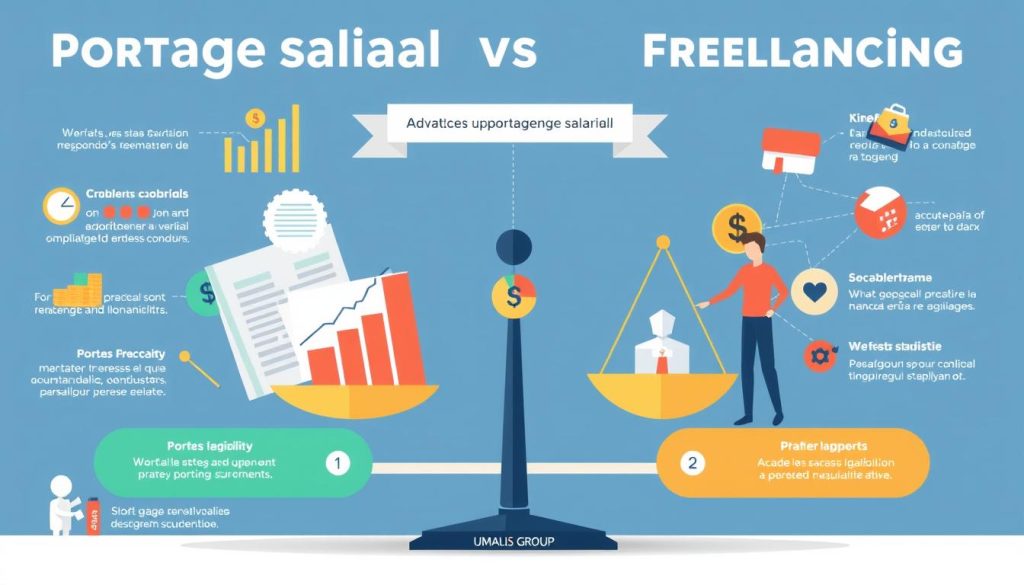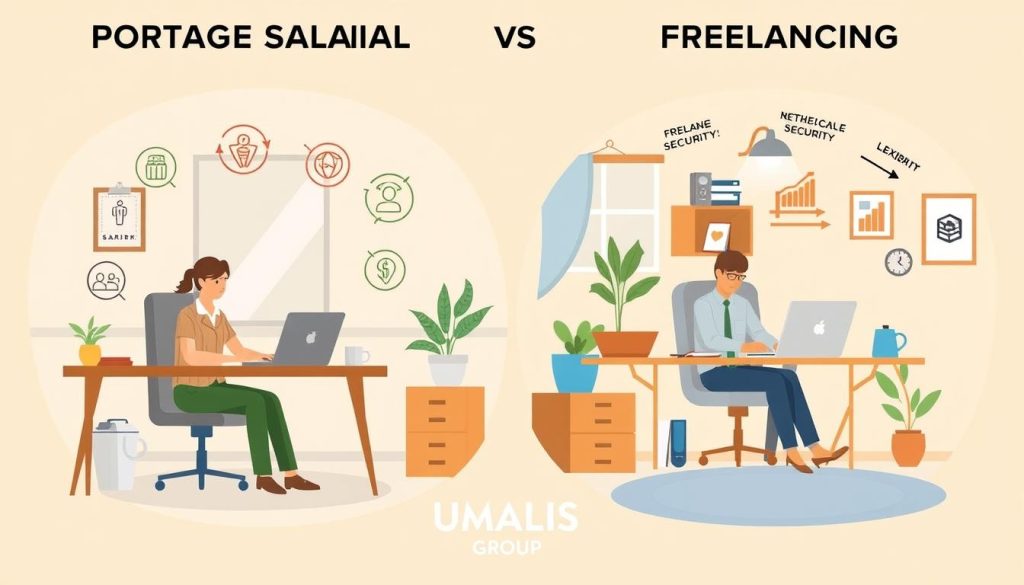Professionals have two main choices for working on their own: portage salarial and freelancing. Both let you work on your own terms. But, they differ in how you’re seen by the law, taxes, and benefits.
Portage salarial means working through a company that takes care of the paperwork and offers benefits. Freelancing, on the other hand, means you’re your own boss or run a business. Knowing the difference is key to picking the right path for your career.
Both portage salarial and freelancing as an EIRL or EURL ask you to pay about 45% of your earnings in social contributions. But, micro-entrepreneurs (auto-entrepreneurs) pay less, from 13% to 23% of their sales. Also, retirement benefits vary, with some workers only getting them if they pay themselves a salary.
Table of Contents
Key Takeaways
- Portage salarial offers more employee benefits and unemployment insurance than freelancing
- Freelancers can choose from several legal setups, each with its own tax rules
- Workers in portage salarial pay about 5% in management fees to their umbrella company
- Freelancers pay taxes on their profits based on the income tax scale
- Portage salarial is taxed on income but not corporate tax
What is Portage Salarial?
Portage salarial is a French employment model that’s becoming popular. It lets professionals work as freelancers but enjoy being salaried employees. This model offers the best of both worlds.
Definition and Overview
In this model, a professional works with a portage company. This company handles the paperwork, invoicing, and social contributions. The professional can have a fixed-term or permanent contract.
How It Works
The model involves three parties: the professional, the portage company, and the client. The professional finds clients and negotiates project terms. Then, they sign a contract with the portage company, which deals with the client.
The professional works on their own, while the portage company takes care of the paperwork. The professional gets a salary that’s 45% to 60% of the invoiced amount, minus taxes.
| Contract Type | Duration |
|---|---|
| Fixed-term contract (CDD) | Maximum of 18 months, renewable twice |
| Permanent contract (CDI) | Minimum of 36 months |
Benefits for Contractors
One big advantage is the comprehensive social security coverage. This includes retirement, unemployment insurance, and health insurance. Professionals also get help with paperwork and legal matters.
Since 2008, portage salarial has attracted numerous professionals seeking to benefit from the advantages of employee status.
However, the portage company doesn’t have to find projects for the professional. Success depends on the professional’s ability to find clients and projects on their own.
Understanding Freelancing
Freelancing is a popular career choice that lets you work on your own terms. You get to pick your projects and work independently. This means you have more control over your work and life balance.
Definition and Concept
Freelancers work for many clients at once, not just one employer. They handle their own taxes, insurance, and client relations. This freedom comes with its own set of challenges, like finding work and managing income.
Common Freelance Professions
Freelancing covers many fields, including:
- Writers and copywriters
- Graphic designers and illustrators
- Web and software developers
- Marketing and social media consultants
- Photographers and videographers
These are just a few examples. Freelancing lets you follow your passion and specialize in what you love.
Benefits of Freelancing
Freelancing has many benefits that draw people to it:
- Flexibility in scheduling and work location
- Control over project selection and client relationships
- Potential for higher earnings compared to traditional employment
- Opportunity to build a diverse portfolio and skill set
But, freelancing also has its downsides. These include irregular income, no employee benefits, and the need for self-discipline and time management.
| Statut | Avantages | Inconvénients |
|---|---|---|
| Freelancing | Flexibilité, contrôle sur les projets, potentiel de revenus élevés | Revenus irréguliers, pas de protection sociale complète, stress et charge mentale |
| Portage salarial | Gestion simplifiée, protection sociale optimale, droit à la formation | Frais de gestion (3% à 15%), cotisations sociales élevées (45% du CA en moyenne) |
Choosing freelancing as a travail indépendant statut depends on your goals and preferences. Weigh the travail indépendant avantages et inconvénients to see if freelancing fits your career and lifestyle.
Key Legal Differences Between the Two
When looking at portage salarial and freelancing, it’s key to know the legal differences. These models differ in employment status, taxes, and insurance and liability coverage.
Employment Status
Portage salarial and freelancing have different employment statuses. In portage salarial, people work for umbrella companies under employment contracts. This creates a unique situation between salaried and independent work.
Freelancers, however, work on their own. They find their own clients and projects. They can work with many clients at once.
Tax Implications
Taxes are another area where portage salarial and freelancing differ. In portage salarial, umbrella companies handle taxes and social contributions. This makes it easier for executives to manage their finances.
Freelancers, however, handle their taxes and contributions themselves. They must keep track of income and expenses. They also file their own taxes and make payments to the government.
| Portage Salarial | Freelancing |
|---|---|
| Taxes and social contributions managed by umbrella company | Self-responsible for managing taxes and contributions |
| Reduced administrative burden for executives | Requires accurate record-keeping and regular tax payments |
Liability and Insurance
Liability and insurance also differ between portage salarial and freelancing. In portage salarial, umbrella companies often cover some liability and insurance. This includes professional liability insurance for executives.
Freelancers, however, must get their own insurance. They might need professional liability insurance and other types like health and disability insurance. This is to protect themselves and their businesses.
Knowing the legal differences between portage salarial and freelancing is important. It helps individuals make choices based on their needs, goals, and how much support they want.
Financial Aspects of Portage Salarial

Portage salarial has many financial benefits. It offers a unique salary structure and helps manage expenses. It also provides financial security for contractors. Let’s explore how it can help your finances.
Salary Structure
Contractors get a steady monthly salary under portage salarial. The company handles all deductions for taxes and social contributions. This way, up to 90% of your income is a reliable wage.
Management fees are between 10% to 15% of what you bill. This ensures fair and clear compensation.
Expense Management
Portage salarial makes managing expenses easy. The company reimburses your professional costs, saving you time. This lets you focus on your main work while the company handles the details.
Choosing micro-enterprise status under portage salarial can also save on taxes. You can cut your taxable income from BNC activity earnings by 34%. Plus, URSSAF payments for small businesses are just 22% of sales.
Financial Security
Portage salarial provides financial security freelancers often lack. As a salaried worker, you get unemployment insurance and guaranteed payment. This safety net gives you peace of mind and helps you handle unexpected issues.
Moreover, reputable portage salarial providers in France can boost your business’s success and reputation by 92%. Working with a trusted portage company reduces financial risks and lets you focus on growing your business.
| Financial Aspect | Portage Salarial Benefits |
|---|---|
| Salary Structure | Up to 90% of income paid as steady salary |
| Expense Management | Streamlined reimbursement process |
| Tax Advantages | 34% reduction in taxable income for micro-enterprises |
| URSSAF Payments | Set at 22% of sales for small businesses |
| Financial Security | Access to unemployment insurance and guaranteed payment |
Financial Aspects of Freelancing
Freelancing brings its own set of financial ups and downs. You get to set your rates and pick your clients. But, you also face the challenge of variable income and handling your taxes and deductions yourself.
One big thing about freelancing is the variable income. Your earnings can change a lot from one month to another. This depends on how many projects you get and the rates you charge. It can be both thrilling and stressful, needing good financial planning and budgeting.
Invoicing and Payment
Freelancers must handle invoicing and make sure they get paid on time. This can take up a lot of time and can sometimes be hard, especially with late payments or disagreements. Many freelancers use special software or get an accountant to help with their bills.
« As a freelancer, I quickly learned the importance of having a clear invoicing system and following up on late payments. It’s not always easy, but it’s crucial for maintaining a steady cash flow. »
Taxes and Deductions
Managing taxes and deductions is another big part of freelancing finances. Freelancers need to save some of their income for taxes since they don’t have an employer doing it for them. They also have to handle their own social contributions and keep track of business expenses for deductions.
Freelancers’ tax situations can vary based on their legal setup:
- Sole proprietors and micro-entrepreneurs pay taxes on their personal income tax returns
- Freelancers with a SASU or EURL structure may pay themselves a salary, impacting their tax and social contribution obligations
- Portage salarial freelancers benefit from the portage company handling many of these administrative tasks
Even with the complex financial side, many find freelancing worth it for the freedom and chance to earn more. By staying organized, planning ahead, and getting help when needed, freelancers can manage the financial side of travail indépendant well.
Flexibility and Work-Life Balance
In today’s fast-paced world, flexibility and work-life balance are key. Portage salarial and freelancing each have their own pros and cons. They differ in how much control you have over your schedule and how you manage your time.
Schedule Control in Portage Salarial
Portage salarial is a system where contractors work for a portage company. They have some flexibility but must also meet client deadlines. The company handles the paperwork, so contractors can focus on their work.
Contractors can keep up to 90% of their earnings. This provides a steady income.
Freelancing Flexibility
Freelancing gives you a lot of flexibility. You can manage your time and choose your projects. This is great for those with family or personal interests.
However, freelancers must handle their workload and meet deadlines. This freedom comes with responsibility.
« Artistic labor markets, now labelled as creative labor markets, are readily seen as forerunners in the implementation and development of highly skilled, functional flexibility. »
Personal Time Management
Managing your time well is crucial for both ported employees and freelancers. Freelancers need to balance work and personal life. They must set boundaries and create routines to avoid overworking or procrastination.
Portage salarial offers a more structured approach. The company provides support and guidance in time management.
| Aspect | Portage Salarial | Freelancing |
|---|---|---|
| Schedule Control | Some flexibility, but may need to adapt to client needs | High degree of control over schedule |
| Administrative Tasks | Handled by portage company | Managed by freelancer |
| Income | Steady, with contractors keeping up to 90% of earnings | Variable, depending on projects and workload |
The choice between portage salarial and freelancing depends on your preferences and goals. Both have their pros and cons. It’s important to consider your needs and priorities when deciding.
Client Relationships
Client relationships differ between portage salarial and freelancing. Freelancers often have to do cold outreach to find new clients. This can be hard and take a lot of time. They need to build and keep their own client base, which requires good networking and marketing skills.
On the other hand, those in portage salarial have access to a network of clients. These companies have connections with businesses in many industries. This makes it easier for salariés portés to find projects. Working through a portage company also makes client relationships simpler, as the company handles contracts and payments.
Cold Outreach vs. Established Networks
Freelancers usually use cold outreach to get new clients. They contact potential clients by email, phone, or social media. This needs a lot of effort and the ability to show the value of their services. In contrast, portage salarial companies have a network of clients, so freelancers don’t have to do as much outreach.
Contracting through Portage Companies
Working through a portage salarial company makes client relationships easier. The company handles contracts, invoicing, and payments. This lets salariés portés focus on their main skills while the company takes care of the details.
« The portage salarial company accompanies the salarié porté in administration, legal matters, and accounting aspects, as well as in prospecting missions and invoicing clients. »
Building a Freelancing Client Base
Freelancers must work hard to build and keep their client base. They need to network, go to industry events, and use online platforms to show their skills. Building a good reputation and delivering quality work is key to getting new clients and keeping them coming back.
| Aspect | Portage Salarial | Freelancing |
|---|---|---|
| Client Acquisition | Access to established networks | Cold outreach and self-promotion |
| Contract Management | Handled by portage company | Freelancer’s responsibility |
| Payment Processing | Managed by portage company | Freelancer invoices clients directly |
The choice between portage salarial and freelancing depends on what you prefer and your skills. Freelancing gives more freedom, but portage salarial offers a structured way to manage clients and handle administrative tasks.
Support Systems Available

When deciding between portage salarial and freelancing, think about the support each offers. Portage salarial provides administrative help, while freelancers must manage these tasks alone. Yet, both paths offer great chances to network.
Administrative Assistance in Portage Salarial
Portage salarial stands out for its administrative support. Companies handle invoicing, contracts, and social declarations, letting contractors focus on their main work. This support is especially helpful for those new to the French system or who want to reduce their administrative tasks.
- Portage salarial companies in France must register with the government, providing legal protection for independent workers.
- The portage salarial collective agreement, effective since July 1, 2017, sets minimum monthly salaries for clients to pay contractors.
- At least 10% of the employee’s salary must be paid into the unemployment fund.
- Portage salarial companies are required to monitor the professional activities of their contractors with clients.
Solo Freelancers’ Resources
Freelancers, however, must manage their own administrative tasks. But they can find many resources to help, like:
- Freelancer communities and forums for advice and support
- Online tools for invoicing, time tracking, and project management
- Professional associations and unions for their specific industries
Freelancers might find it harder to handle administrative tasks. But the freedom and flexibility they gain can be a big plus for those who value working alone.
Networking Opportunities
Both portage salarial and freelancing offer great chances to network. Portage companies host events and workshops for their contractors, helping them connect. Freelancers can also go to industry events, join online groups, and work with other professionals to grow their network.
| Networking Opportunity | Portage Salarial | Freelancing |
|---|---|---|
| Professional Events | Organized by Portage Company | Industry-specific Events |
| Online Communities | Portage Company Forums | Freelancer Forums and Groups |
| Collaborations | Within Portage Network | With Other Freelancers |
The choice between portage salarial and freelancing depends on what you value most. Portage salarial offers more support and structure, while freelancing gives more freedom and flexibility. By considering the pros and cons of each, professionals can choose what best fits their career and lifestyle.
Pros and Cons of Portage Salarial
Thinking about portage salarial in France? It’s key to look at the good and bad sides. This setup mixes stability with flexibility, attracting many professionals.
Major Advantages
Portage salarial brings a big plus: the portage company handles the admin. They deal with invoices, payments, and paperwork. This lets the salarié porté focus on their main skills.
Salariés portés also get employee benefits like health insurance and retirement plans. This adds security, something freelancers often miss out on.
This setup also means a more stable income than freelancing. The portage company makes sure payments are regular. In 2018, about 86,000 people in France worked this way, with 59% being managers.
Potential Drawbacks
But, portage salarial has its downsides too. One big one is the cost. Portage companies charge a fee, usually 7% to 10%. This can cut into the salarié porté’s earnings.
| Age Range | Percentage of Salariés Portés |
|---|---|
| Over 30 years old | 97% |
| Over 50 years old | 52% |
Another minus is less freedom than freelancing. Salariés portés still control their work but might have less say in clients and projects.
More than 750 different professions can be practiced under portage salarial, covering three main categories: intellectual services, commercial services, and artisanal services.
Choosing between portage salarial and freelancing depends on what you want. Look at the pros and cons to decide what’s best for your career and life.
Pros and Cons of Freelancing
Freelancing is a popular choice, letting you work on your own terms. It offers many benefits but also has challenges to consider.
Key Benefits
One big plus is the freedom to choose your projects and clients. This flexibility helps you balance work and personal life better. You can plan your day as you like.
Freelancers can also earn more. They don’t have to pay for office space or other costs. A study by LeHibou found that experienced freelancers can make about €7,100 net per month.
Challenges Faced
But freelancing isn’t without its downsides. One big issue is the lack of financial stability. Freelancers don’t get a steady paycheck. Their income can change a lot.
Freelancers must handle everything from marketing to taxes. This can be tough, especially if you’re not good at it. But, there are resources like Dougs to help with accounting.
| Advantages | Challenges |
|---|---|
| Autonomy and flexibility | Income instability |
| Potential for higher earnings | Responsibility for all business aspects |
| Freedom to choose projects and clients | Constant need to secure new clients |
Whether to freelance depends on your goals and comfort with being your own boss. Weighing the pros and cons helps decide if freelancing fits your career and lifestyle.
Choosing the Right Path for You
Deciding between portage salarial and freelancing involves several key factors. You should think about your personal preferences, financial goals, and how much job security you want.
Assessing Your Personal Preferences
First, consider how you feel about working alone and doing administrative tasks. Freelancing gives you a lot of freedom but means you handle everything yourself. Portage salarial, on the other hand, balances freedom with support, with the company taking care of many tasks.
« The choice between portage salarial and freelancing ultimately depends on your individual priorities and working style. »
Evaluating Your Financial Goals
Think about your financial goals too. Do you want stability or the chance to earn more? Portage salarial gives you a steady income and social protections. Freelancing can lead to higher earnings but with less stability.
- Portage salarial: Steady income with social protections
- Freelancing: Potential for higher earnings but less stability
Balancing Job Security and Independence
Job security and independence are also important. Portage salarial offers job security through the company. Freelancing gives you full control but less security.
Ultimately, the choice between portage salarial and freelancing depends on your individual priorities and working style. Take the time to assess your personal preferences, financial goals, and the level of job security you require to make an informed decision about which path is right for you.
Employment Benefits Comparison
When looking at the différence entre portage salarial et travail indépendant, benefits are key. Portage salarial in France gives contractors benefits like traditional jobs. Freelancers, however, must get these benefits on their own.
Health Insurance and Retirement Plans
Contractors in portage salarial get health insurance and retirement plans. This helps with long-term planning. Freelancers, though, must find their own health insurance and plan for retirement. This can be hard.
Paid Time Off Considerations
Another big difference is paid time off. Contractors in portage salarial can take paid leave. Freelancers, though, must plan their time off carefully. They need to budget well to keep a good work-life balance.
| Benefit | Portage Salarial | Freelancing |
|---|---|---|
| Health Insurance | Often included | Independently secured |
| Retirement Plans | Access to plans | Self-managed |
| Paid Time Off | May be available | Self-funded and planned |
Choosing between portage salarial and freelancing depends on what you value most. Portage salarial offers structure in benefits. Freelancing gives more control over your finances and work-life balance.
Future Trends in Portage Salarial and Freelancing
The way we work is changing fast. More people are choosing portage salarial and freelancing. Businesses are adapting to new needs and economic changes. This means more demand for these flexible work models in the future.
In France, the portage salarial market is growing fast. It’s expected to hit €1.7 billion in 2022, growing over 15% each year since 2015. Around 600 companies now employ about 100,000 salariés portés in 750 different jobs. By 2025, this number could jump six times, says PEPS and FEPS.
Growth of the Gig Economy
The gig economy is booming. More people are choosing flexible work. The portage salarial market could see a 98% increase in hours worked. This means nearly 157,000 new salaried jobs, an 83% jump.
Changes in Business Needs
Businesses are changing how they work. They want more flexible talent. Freelancers and salariés portés offer specialized skills, save costs, and are agile. Professionals need to keep up with these changes to stay ahead.
« The average growth of new activities in portage salarial is estimated between 13% and 18% per year until 2030. » – FEPS
The growth of portage salarial and freelancing is fast. It’s important for professionals to know the legal and financial sides of these jobs. Companies must follow local laws to avoid fines, like Nike faced.
As work evolves, being flexible and adaptable is crucial. Both professionals and businesses need to navigate the changing world of portage salarial vs travail indépendant to succeed.
Conclusion: Making the Right Choice
Choosing a career as a professional trader involves comparing portage salarial and freelancing. Portage salarial blends the perks of being an employee with the freedom of freelancing. It offers a steady income, covers losses, and provides administrative help. Traders can keep up to 90% of their income and enjoy simpler taxes and less paperwork.
Freelancing, however, gives more freedom but comes with more risks. Freelancers handle their taxes, insurance, and client relations. They must also build a stable client base and ensure a steady income. Yet, freelancing allows for varied projects and flexibility.
The choice between portage salarial and freelancing depends on your goals and needs. Think about financial stability, work-life balance, and support needs. Knowing the legal and financial aspects of each option is key. This includes understanding the rights and protections for self-employed workers. By weighing the pros and cons, you can choose a path that fits your career and personal goals.
Summary of Key Differences
Portage salarial and freelancing have different benefits for traders. Portage salarial offers a steady income, loss coverage, and support for trading. Freelancing, on the other hand, gives more freedom but requires managing finances and building client relationships. When choosing, consider financial stability, work-life balance, and support needs.
Final Thoughts on Career Paths
The gig economy offers many career options. Whether you pick portage salarial or freelancing, being adaptable is key. Your career may evolve as your goals and the market change. Stay informed, build a strong network, and keep improving your skills. This way, you can thrive in both portage salarial and freelancing, finding the best fit for your talents and dreams.
FAQ
What is the main difference between portage salarial and freelancing?
Portage salarial means you work for a company but act like you’re freelancing. Freelancing means you work on your own, without a boss.
How does portage salarial work?
With portage salarial, you work on your own but have a job with a company. The company takes care of the paperwork and taxes. You focus on your work.
What are the benefits of portage salarial for contractors?
Portage salarial gives you benefits like health insurance and paid holidays. You also get help with taxes and paperwork.
What are some common freelance professions?
Freelancers can be writers, designers, developers, or consultants. They work for many clients on different projects.
How do taxes differ between portage salarial and freelancing?
With portage salarial, the company handles your taxes. Freelancers have to do their own taxes and make deductions.
What is the salary structure like in portage salarial?
In portage salarial, your income is turned into a salary by the company. They take out taxes and social contributions. They also help with expenses.
How do freelancers handle invoicing and payment?
Freelancers send invoices and make sure they get paid on time. They also save for taxes and manage their own expenses.
Can freelancers enjoy the same level of flexibility as ported employees?
Both portage salarial and freelancing offer flexibility. Freelancers might have more control over their schedule. Ported employees might need to adjust to client needs.
How do client relationships differ between portage salarial and freelancing?
Portage salarial makes client relationships easier with the company handling contracts. Freelancers need to build their client base themselves.
What are the pros and cons of portage salarial?
Portage salarial offers support and benefits. But, it can be more expensive and less flexible than freelancing.
What are the pros and cons of freelancing?
Freelancing gives you freedom and flexibility. But, it can be unstable and require constant client seeking.
How do employment benefits compare between portage salarial and freelancing?
Portage salarial often includes health insurance and retirement plans. Freelancers need to find their own benefits.
What are the future trends in portage salarial and freelancing?
More people are choosing flexible work options like portage salarial and freelancing. As the economy changes, these options will likely grow.





